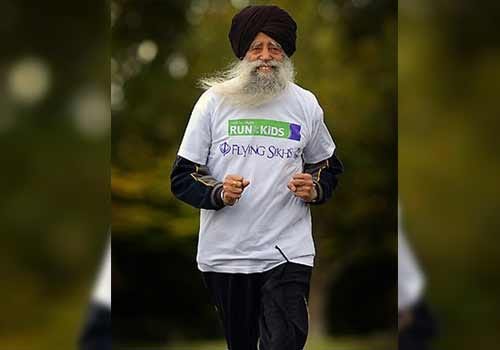Legends never die - their stories live with us
Baba Fauja Singh - From the oldest marathon runner to an inspiration for generations to come.
Baba Fauja Singh's story goes beyond just marathons; it embodies the essence of living with purpose. At the age of 114, his journey ended in the same place where it began—Beas village in Punjab—when a tragic road accident claimed his life. However, the legacy he left behind will resonate through generations, particularly for Sikhs and young people around the world who seek strength, identity, and meaning in an ever-changing world.
He wasn't always known as the Turbaned Tornado. Born in 1911, he was a fragile child who couldn’t walk until the age of five. People believed he was crippled, but he quietly worked on improving himself, took to farming, and led a simple life. There was no intention of seeking fame. It was the pain of life that propelled him toward greatness.
After losing both his wife and then his son, Fauja Singh turned to running in his late 80s—not to win medals, but to cope with his grief. From that point forward, he redefined what aging means, what endurance looks like, and how discipline and simplicity can carry a person through countries, milestones, and decades.
What made his story powerful wasn’t just that he ran marathons in his 90s and even at 100. It was that he carried his identity—his turban, his values, and his calm presence—with pride on every global platform he stepped onto. He didn’t need loud words or grand speeches; his silence carried more weight than most voices.
Young people today live in a world filled with distractions, and their sense of identity can often feel unclear. From Fauja Singh, they can learn that it is possible to stay rooted while still rising. Your past does not limit your potential, starting late does not mean you are beginning wrong, and physical strength is worthless without mental and emotional strength to support it.
In every race, he demonstrated that success comes not from competing with others, but from consistently pushing your own limits. He didn't seek fame; rather, his dedication, humility, and resilience made him a global figure. He proved that living with integrity can be transformative. He never took shortcuts, never boasted about his achievements, and never allowed success to change who he was.
His story illustrates a broader truth: your pain can become your strength if you harness it correctly. Fauja Singh ran not to flee from his loss but to honour it. His strides were dedicated to the memories of loved ones, his community, and the causes he believed in. He raised money for charity, fought against drug abuse, and helped remind people—both young and old—that your body can continue to move forward as long as your spirit remains strong.
For future generations, particularly Sikh youth, Fauja Singh serves as a powerful reminder that faith and modern life can coexist. It is possible to progress in the world while remaining true to your roots. You can wear your turban in stadiums, feature it on billboards, and carry the Olympic torch, all while earning respect, not despite your identity, but because you stay authentic to it.
Fauja Singh's life teaches us that it doesn't matter how quickly you begin or how far you've fallen behind. What truly matters is the direction you're facing and the courage it takes to take the next step forward.
The finish line didn’t define his journey; rather, it was shaped by the effort, values, and quiet strength he exhibited with each step. Although he may have departed from this world, his story now serves as an inspiration for the future.
He is no longer here to run. But the path he paved will guide countless others to stand up, start late, stay strong, and never stop moving.


